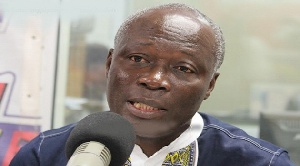Mr. Dolapo Ogundimu, Managing Director of Access Bank Ghana, has called on African leaders to build upon the abundance of creative ideas in the continent in order to solve age-old social and economic problems -- rather than rely on wholesale importation of ideas.
“The pace of innovation has been so rapid in recent years, and it is hard to imagine how individuals, businesses and countries would have made the giant leaps they have without theses technological advancements. What is obvious is that Africa has contributed little or nothing to these innovations that continue to change the way we live our lives and do business.
“Over 90 percent of the world’s most remarkable innovations have come from outside of Africa. These improved products and new innovations from Europe, Asia and the Americas are either sold or shipped wholesale to Africa and have not added value in solving our age-old social and economic problems.”
He was speaking at the opening of a two-day Annual Africa Innovation Forum in Accra, held under the theme “Unleashing Innovation Leadership in Africa”. He said the current economic and demographic dynamics present an opportune time for Africa’s leaders to seize the opportunity in order to attain the economic successes that the continent desperately needs.
“Africa today is one of the world’s most dynamic growth regions. Seven out of the world’s 10 fastest-growing economies are found in sub-Saharan Africa, growing at an annual average rate of about 5 percent. As an emerging market, there is no doubt that Africa has a lot of space and room for creating new things -- either through invention or innovation.
“Secondly, while countries in Asia, Europe and the US are worried about pensions and a rapidly aging population, the emerging African market has a youthful population. It is estimated that about 44 percent of the population in sub-Saharan Africa is under the age of 15, compared with only16 percent in Europe and about 30 percent in Asia.”
Professor Kwaku Atuahene-Gima, the founder and president of the International Foundation for Africa Innovation (IFAI), said: “We just have to train people [in order to turn our managers into innovative leaders]; that is why IFAI has set up this kind of organisation to train people to develop their skills. Without the skills you cannot do anything.
“The good thing is that our leaders travel a lot and see a lot of things. The key question is: are they learning from this to transfer them back here and change the way we solve problems? Maybe they don’t do that. One of the key things about being creative and innovative is to be able to go outside your environment to see what solutions other people are using, and adapt that solution to your country.”
He attributed the tame innovation efforts in the country and the continent to fear, uncertainty and lack of belief on the part of business leaders and public-office holders. Professor Atuahene-Gima, who is also a professor of Marketing and Innovation Management at the China Europe International Business School (CEIBS), said the event will be held annually and rotated among various African countries.
The two-day event was organised by IFAI with sponsorship from Access Bank Ghana and BIA Conferences, a subsidiary of the B&FT.
Business News of Thursday, 8 August 2013
Source: B&FT
Look inward for innovative ideas - Access Bank boss

Entertainment















